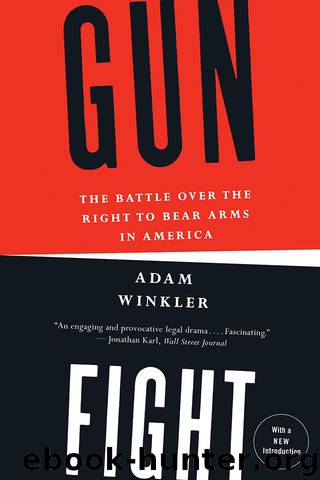Gunfight: The Battle Over the Right to Bear Arms in America by Winkler Adam

Author:Winkler, Adam [Winkler, Adam]
Language: eng
Format: epub, mobi
Publisher: W. W. Norton & Company
Published: 2011-09-19T00:00:00+00:00
CHAPTER 8
BY ANY MEANS
NECESSARY
THE SEATING IN THE SUPREME COURT IS NOT DESIGNED well for spectators. The floor has no pitch, so when the courtroom is crowded you can see only the justices up on their raised bench and the back of everyone else’s head. When Alan Gura rose from his seat and walked toward the podium, people in the rear of the room sat up tall and craned their necks to get a better view. Most people there didn’t know what he looked like. The slender thirty-seven-year-old with the tousled black hair wasn’t a prominent member of the local bar, and, in contrast to Paul Clement and Walter Dellinger—who combined had argued scores of cases in the Supreme Court—Gura was making his first appearance at the high court’s lectern. In fact, he hadn’t argued many appeals in any court, anywhere.
“No, not too much,” Gura said when asked whether he had previous experience in the appellate courts. “Two, maybe three” prior cases, he estimated. In fact, his argument before Judge Silberman and the other judges in the D.C. Circuit was his first argument in a federal court of appeals. When he was a government lawyer in California just out of law school, he had “been to court plenty of times. Of course the task of arguing to a judge is very different from arguing to a jury,” he admitted. He just hadn’t had the chance to make many arguments in front of a panel of judges before. “Most things settle,” he said.1
In the months leading up to the oral argument, people in the gun rights community were pressuring Bob Levy, who was financing the case, to replace Gura with a more experienced Supreme Court advocate. They wanted him to hire a heavyweight like Ted Olson, who won the Bush v. Gore case, or Ken Starr, the former solicitor general and Whitewater prosecutor. Levy refused. Early on, when Gura was willing to work on the case for almost no money, Levy had promised Gura he could see this case through to the end. Such a deal was easy to make back then, when most lawyers would have thought the lawsuit would never make it to the Supreme Court. Levy, however, not only was a man of his word but thought Gura knew this case “better than anybody in the world.” Yet, it was still a big risk. If Gura fumbled, Levy, who had defied the NRA from the very beginning of the lawsuit, would be heavily criticized by his friends in the gun rights community for years to come.2
For Gura, the stakes were even higher. A misfire in such a high-profile case would probably make this his last Supreme Court appearance. To make matters worse, Gura was up against two legal titans in Dellinger and Clement. Clement was widely recognized as one of the top appellate advocates in the country, and Dellinger was a seasoned veteran who, as the Washington Post put it, “was winning arguments in the Supreme Court when Gura was still studying for the bar exam.
Download
Gunfight: The Battle Over the Right to Bear Arms in America by Winkler Adam.mobi
This site does not store any files on its server. We only index and link to content provided by other sites. Please contact the content providers to delete copyright contents if any and email us, we'll remove relevant links or contents immediately.
| Elections & Political Process | Ideologies & Doctrines |
| International & World Politics | Political Science |
| Public Affairs & Policy | Specific Topics |
| United States |
The Secret History by Donna Tartt(16740)
The Social Justice Warrior Handbook by Lisa De Pasquale(11514)
Thirteen Reasons Why by Jay Asher(7849)
This Is How You Lose Her by Junot Diaz(5838)
Weapons of Math Destruction by Cathy O'Neil(5091)
Zero to One by Peter Thiel(4876)
The Myth of the Strong Leader by Archie Brown(4816)
Promise Me, Dad by Joe Biden(4489)
Beartown by Fredrik Backman(4477)
How Democracies Die by Steven Levitsky & Daniel Ziblatt(4460)
Stone's Rules by Roger Stone(4447)
The Fire Next Time by James Baldwin(4388)
100 Deadly Skills by Clint Emerson(4119)
A Higher Loyalty: Truth, Lies, and Leadership by James Comey(4070)
Rise and Kill First by Ronen Bergman(4058)
The David Icke Guide to the Global Conspiracy (and how to end it) by David Icke(3928)
The Farm by Tom Rob Smith(3902)
Secrecy World by Jake Bernstein(3818)
The Doomsday Machine by Daniel Ellsberg(3767)
